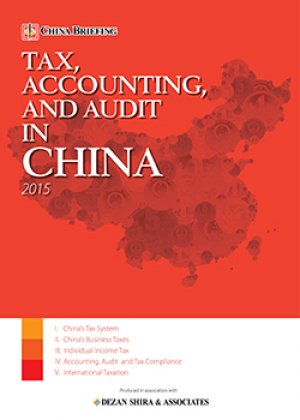China to Expand Tax Breaks for High-Tech Services Outsourcing Enterprises
SHANGHAI – According to a Nov. 26 announcement of the State Council, China will implement a number of targeted policies to accelerate the development of its services outsourcing industry as means of boosting foreign trade and restructuring the economy toward greater added-value production.
The proposed policies include an expansion to the category of “prioritized outsourcing services” to include the outsourcing of software and information technology, R&D, financial and governmental services, as well as the creation of an “international level” outsourcing platform.
Additionally, to provide greater financial support to small and medium-sized enterprises in the industry, the announcement called for an increase in the number of service outsourcing “model cities”, thereby expanding the number of high-tech services outsourcing enterprises able to qualify for a 15 percent Corporate Income Tax (CIT) rate, employee education deductions, and zero-rated or exempted VAT.
Following the expansion of China’s VAT reform to offshore outsourcing services in January of this year, VAT exemptions were made available for ITO (Information Technology Outsourcing), BPO (Business Process Outsourcing) and KPO (Knowledge Process Outsourcing) services provided by pilot taxpayers to foreign entities under an entrustment contract.
![]() Related: China Specifies VAT Exemption for Offshore Outsourcing Services
Related: China Specifies VAT Exemption for Offshore Outsourcing Services
Previously, these preferential policies were only available in twenty-one “model cities”, including Beijing, Shanghai and Xi’an, based on the “Notice on Business Tax Exemptions for the International Service Outsourcing Industry in Model Cities” (2010). Last week’s announcement did not specify which cities would be newly eligible for the tax breaks.
“This move could have a significant impact on payroll and treasury services in China,” says Chris Devonshire-Ellis, Founding Partner of Dezan Shira & Associates. “But instead of tinkering with the tax base, China should be thinking more strategically along the lines of making the RMB more tradable on global markets. The closed nature of the currency makes it hard to deal with cross-border services, despite the availability of tax breaks. The Government needs to embrace total investment solutions, not just tax incentives.”
“China used to offer a 15 percent CIT rate for foreign investors in the manufacturing industry, and still does for certain encouraged industries and areas promoted for investment. Yet in recent years, the provision of tax sops has proven less and less attractive to investors, due to regulatory barriers or commercial difficulties getting in the way of the intended benefits.”
|
Asia Briefing Ltd. is a subsidiary of Dezan Shira & Associates. Dezan Shira is a specialist foreign direct investment practice, providing corporate establishment, business advisory, tax advisory and compliance, accounting, payroll, due diligence and financial review services to multinationals investing in China, Hong Kong, India, Vietnam, Singapore and the rest of ASEAN. For further information, please email china@dezshira.com or visit www.dezshira.com. Stay up to date with the latest business and investment trends in Asia by subscribing to our complimentary update service featuring news, commentary and regulatory insight. |
![]()
 Tax, Accounting, and Audit in China 2015 This edition of Tax, Accounting, and Audit in China, updated for 2015, offers a comprehensive overview of the major taxes foreign investors are likely to encounter when establishing or operating a business in China, as well as other tax-relevant obligations. This concise, detailed, yet pragmatic guide is ideal for CFOs, compliance officers and heads of accounting who must navigate the complex tax and accounting landscape in China in order to effectively manage and strategically plan their China operations.
Tax, Accounting, and Audit in China 2015 This edition of Tax, Accounting, and Audit in China, updated for 2015, offers a comprehensive overview of the major taxes foreign investors are likely to encounter when establishing or operating a business in China, as well as other tax-relevant obligations. This concise, detailed, yet pragmatic guide is ideal for CFOs, compliance officers and heads of accounting who must navigate the complex tax and accounting landscape in China in order to effectively manage and strategically plan their China operations.
 Revisiting China’s Value-Added Tax Reform
Revisiting China’s Value-Added Tax Reform
In this issue of China Briefing Magazine, we review recent steps taken by the Chinese government to reform its value-added tax policy. Specifically, we examine the sectors covered by the new Pilot Reform program with a focus on tax rates, taxpayer status and the calculation of VAT. We also include a VAT Pilot Reform Rates Chart, which overviews each affected industry’s tax rate and VAT exempted services.
 Double Taxation Avoidance in China: A Business Intelligence Primer
Double Taxation Avoidance in China: A Business Intelligence Primer
In our twenty-two years of experience in facilitating foreign investment into Asia, Dezan Shira & Associates has witnessed first-hand the development of China’s double taxation avoidance mechanism and established an extensive library of resources for helping foreign investors obtain DTA benefits. In this issue of China Briefing Magazine, we are proud to present the distillation of this knowledge in the form of a business intelligence primer to DTAs in China.
- Previous Article Tax, Accounting, and Audit in China 2015 – New Publication from China Briefing
- Next Article Deregistering a Representative Office, Part 2: The Importance of Being Audited









